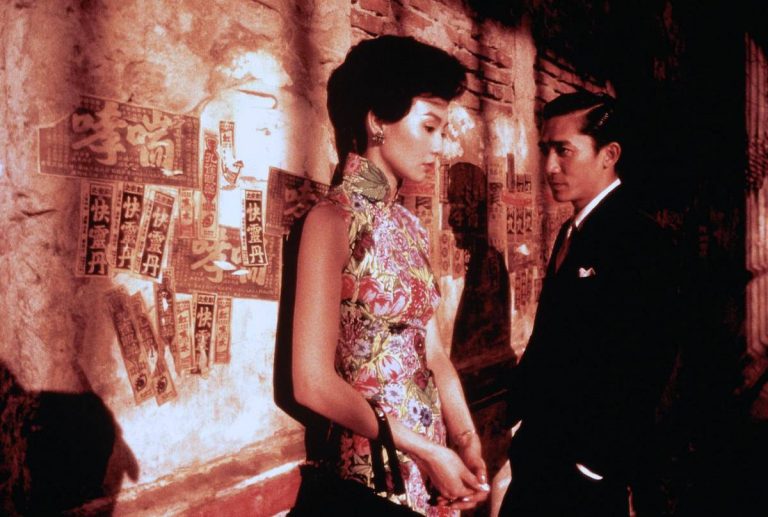250 films, 250 reviews. This is a pretty crazy idea, but who doesn’t love a challenge? Here at Cultured Vultures we’ll be counting down the IMDb Top 250 with a review for each from one of our dedicated film writers. Everything from Goodfellas to Casablanca will be covered over the next year or so for you film lovers to enjoy. You can’t say we don’t spoil you, you lovely lot. – Ashley, Project Lead
One of the reasons that Asian cinema fascinates me as much as it does is the level of creative control directors are often afforded. As long as a script is solid enough to get the funding, the end result may well end up having virtually nothing to do with the original story. Wong Kar Wai has been taking advantage of this system for the length of his career, producing daring, abstract, imaginative films with almost complete creative control. In the Mood for Love is arguably his best. It was originally intended as one segment of a trilogy of stories interlocked into a single film, like Wong had done in his earlier breakout hit, Chungking Express. After one thing had led to another, the plot was extended to feature length, the period was changed from contemporary to 1960s and the setting was moved from Beijing to Hong Kong. The latter had a lot to do with the political unrest going on in mainland China at the time (2000).
It took a grueling 15 months to shoot in a confined environment with a minimal cast and a fanatical attention to detail, Wong is a child of the 60s himself and he was hell-bent on making sure that the film remained truly authentic. He demanded almost unreasonably massive amounts of commitments from his cast and crew, shooting the same scenes over and over again in different, similar locations until he was satisfied. Cinematographer, frequent collaborator, and all-round weird person Christopher Doyle actually had to leave near the end of the shoot because of a scheduling conflict, leaving Mark Lee Ping Bin to finish the film. The results speak for themselves, In the Mood for Love is a magnificent, striking tale of romance, loneliness and attachment.
The story is easy enough to follow, two married couples move into the same, heavily cramped apartment block. Maggie Cheung is an executive assistant with an absentee husband who disappears on business trips to Japan or wherever for weeks at a time, while Tony Leung plays Chow, a journalist whose wife is forever working late. The two of them begin to bond, as they spend so much time in close proximity and frequent the same noodle shop. As time goes by it become apparent that their respective spouses are having an affair and the two begin to feel a nagging temptation to do likewise. With the wrong mindset, you might spend this entire film impatiently waiting for some kind of erotic, physical payoff, but you won’t get it. Leung and Cheung were two of China’s biggest stars at the time, and they really sell the chemistry between the two tragic characters, but this isn’t that kind of film, in fact it’s almost the antithesis to that.
The fact of it is that both of them are trapped in a bustling, prying environment with no room for extra-curricular activity, especially not the adulterous kind. The film never lets you forget that, voyeurism plays a massive part in the psychology of cinema but it’s perhaps more overt here than in any other film this side of Look (which was filmed entirely on CCTV). The camera peaks around corners, from under the bed and catches glimpses of dramatic moments reflected in a bathroom mirror. As a viewer, you are made to feel like an intruder. Meanwhile, the other half of this affair (the ones actually doing the cheating) are left almost entirely off-screen, save for the odd glimpse of Chow’s wife from behind (and though a window). Wong is much more interested in the relationship between the two tortured, neglected cuckolds, who spend their evenings rehearsing the difficult conversations about the future, as the moment their partners admit their wrong doing.
The tension is palpable and unnerving. Despite being a film in which the characters barely touch each other, it’s almost visceral in the way it’s presented. You can almost smell the rainwater and the sweat as people squeeze through cramped staircases and tight corridors. These aren’t necessarily poor people, Cheung spends the entire film made up like she’s going to the Jefferson Ball, but 60s Hong Kong was a claustrophobic cattle grid regardless of income. This isn’t the kind of love story we’re meant to glom onto, in the hope of some schmaltzy ending involving a kiss and a sunset, this is so much more poignant, so much realer. It’s beautiful, tragic and deeply poetic, not least during the meditative, heartbreaking final moments. In a cinematic world filled with ridiculous, implausible stories of love that beats the odds, this is a welcome, scathing reminder that the odds usually win out.
Note: the IMDb Top 250 Cultured Vultures are using is based on the standings from the 16th of November. Inconsistencies may apply.
Some of the coverage you find on Cultured Vultures contains affiliate links, which provide us with small commissions based on purchases made from visiting our site. We cover gaming news, movie reviews, wrestling and much more.



